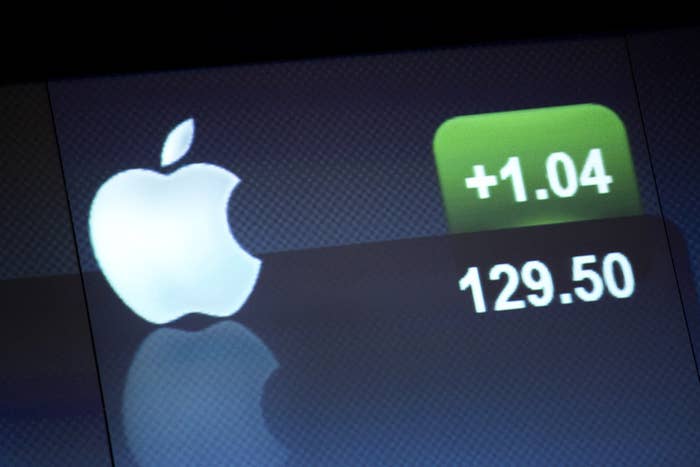
America's oldest and most widely quoted stock market index has finally acknowledged the smartphone revolution, a few days before Apple is set to release more information about its first major new product since the iPad. The Dow Jones Industrial Average, the Wall Street Journal reported today, will kick out AT&T and bring in Apple by the close of trading on March 18.
The Dow is made up of just 30 blue-chip companies that supposedly reflect the overall performance of American industry. But unlike other indices that investors follow more closely, like the S&P 500 or the Nasdaq 100, the 119-year-old DJIA is weighted by the dollar price of the individual stocks in the index instead of the overall size of the companies.
That creates some very strange results. It will mean Apple, the world's biggest public company, with a market capitalization of $753 billion, will be less important to the index than 3M or Goldman Sachs, whose shares cost $166.70 and $189.72 respectively. 3M's market capitalization, however, is $106 billion, while Goldman's is $86 billion. In the Nasdaq 100, Apple has a massive weight of about 15% of the index; on the DJIA, based on current prices, it will account for just over 4% — roughly the same as its weighting in the the S&P 500 index, which contains 500 companies, including dozens of corporate giants not part of the 30-company Dow.
"The shift in Dow components reflects Apple's technology leadership and the need to rejigger the index for a pending 4-for-1 stock split by Dow component Visa Inc.," the Journal reported.
That a stock split by Visa, currently the highest-weighted stock in the index at almost 10%, is the cause of such rejiggering is itself a symptom of the Dow's shortcomings. Because the Dow classifies Visa as an "information technology" company, the Journal explained, the stock split, and matching reduction in Visa's share price, would drag down how much technology companies are represented in the index. That has created an opening for Apple to join IBM, Intel, Cisco, and Microsoft in representing America's most dynamic industry in the Dow.
So this is how the maker of the iPhone ends up being represented in the country's highest-profile stock index: not through the global triumph of the smartphone economy, but via stock split at a credit card network.
But even if you put its strange technology imbalance aside, the vintage, handcrafted Dow fails as a reflection of hearty middle-American industry and commerce. Wal-Mart and Exxon Mobil, the world's largest retailer and its largest energy company, are the Dow's 15th and 17th most heavily weighted stocks, running behind smaller players like Home Depot and insurance company Travelers.
Any index that's supposed to reflect the broad strength of the U.S. economy that takes until 2015 to include Apple — which has been worth more than $300 billion since early 2011 — is functionally declaring its obsolescence. And Apple is only considered for inclusion today thanks to a bit of financial engineering of its own: Apple announced a 7-to-1 stock split last year, bring the price of a single share from about $646 to under $100.
The difference in weighting — and thus, usefulness as a tracker of major sectors of the economy — is reflected in how much investors follow the index as a whole. According to Morningstar, the SPDR Dow Jones Industrial Average ETF, a security that's traded like a stock and tracks the Dow, has $12.42 billion in assets, while the SPDR S&P 500 ETF has $191.77 billion in assets and the PowerShares QQQ ETF, which tracks the Nasdaq 100 and is thus very heavily weighted toward tech stocks like Apple, has $40.83 billion.
But still, the Dow is tracked obsessively by many large media outlets and attracts some investor interest; Apple's shares are up 2% in early trading today. And media has a hand in its management: "Component stocks of the Dow are selected by the index committee, a group that includes editors of The Wall Street Journal, the newspaper reported today. Apple is hosting an event on Monday to unveil more details about its new watch, and interest in the company has never been higher. Now it has a new index to conquer, alongside the watch industry.

